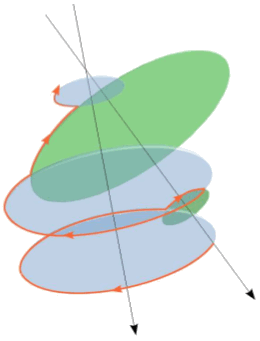|
 |
| A spin qubit flipping states also flips the field acting on nearby nuclear spins between
two orientations (shown as arrows). The nuclear spin vector follows a path conditional on the specific
trajectory of the qubit, so that they are entangled. |
This schedule is a
rough guide - we will however try to stick to it but the emphasis will be
on the discussion. The meeting is intended to be informal.
Saturday, November 15, 2008
|
08.15 Rendez-vous, Hotel lobby
|
|
09.00-10.00 | INTRO: Philip Stamp, Steve Hill
| | 10.00-10.45 | Discussion
| | 10.45-11.00 | Break
| | 11.00-12.00 | COHERENCE EXPTS
Irinel Chiorescu: Multiphoton coherent driving in harmonic and non-harmonic spin systems
Susumu Takahashi: Coherent Manipulation and Decoherence of S=10 Single-Molecule Magnets
| | 12.00-13.00 | Discussion
| | 13.00-14.00 | LUNCH
| | 14.00-15.00 | DECOHERENCE THEORY
Igor Tupitsyn: Decoherence in molecular magnets: Fe-8 and Mn-12
Sasha Burin: Nuclear spin diffusion in the crystal of magnetic molecules
| | 15.00-16.00 | Discussion
| | 16.00-16.30 | Break
| | 16.30-17.30 | TUNNELING
Enrique del Barco: Observation of QTM selection rules in a Mn3 single-molecule magnet
Eduardo Mucciolo: Berry phase induced Kondo effect in single-molecule magnets
| | 17.30-18.30 | Discussion
| | (it is highly likely we will run on a little after this)
|
Sunday, November 16, 2008
|
08.30-09.30 | CHEMISTRY
Eugenio Coronado Miralles: Chemical design of molecular nanomagnetics
Vladimiar Kolesnichenko: Ultrasmall iron oxide nanoparticles: synthesis, surface chemistry and magnetic properties
| | 09.30-11.30 | Discussion and wrap-up
| | (depending on plane flights we might shift this a little later)
|
|
 |
| Examples of magnetic molecules. Top: Fe8. Eight s=5/2 FeIII ions are forming a
total spin S=10 (six spins are parallel and antiparallel to the other two); middle: Ni12 with
a total spin S=12; bottom: Mn12 with a total spin S=10.
|
|




